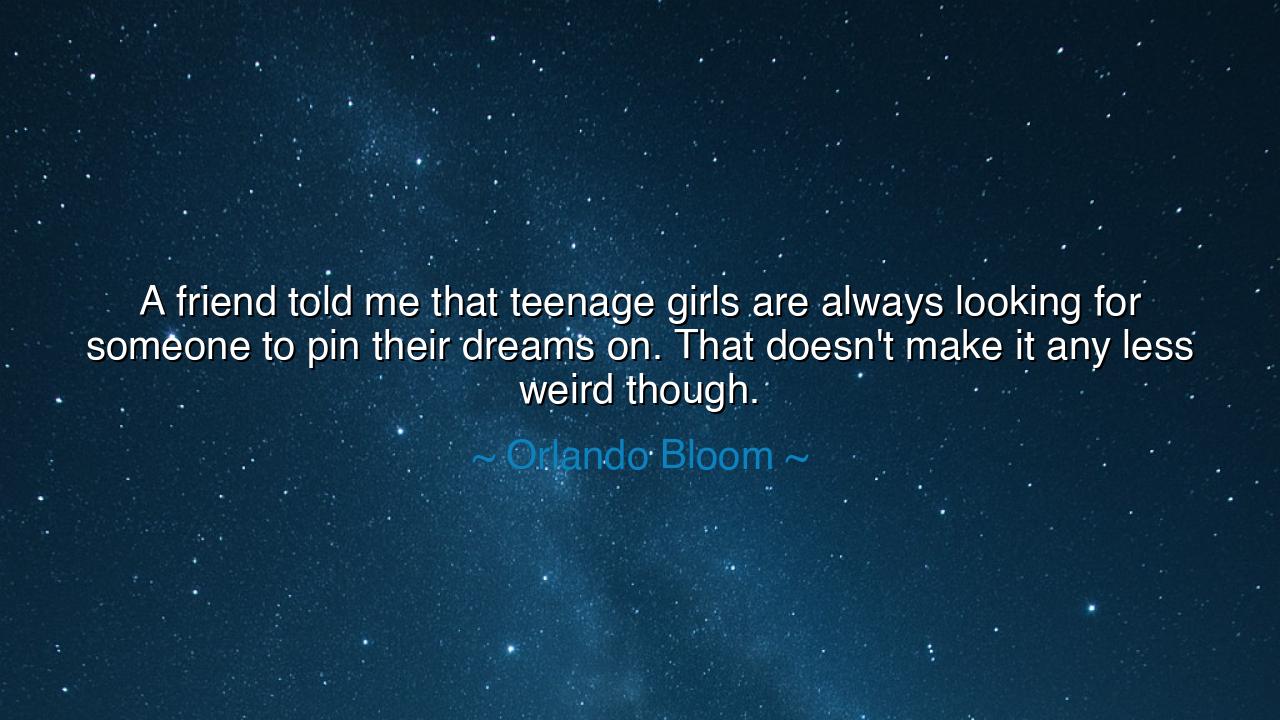
A friend told me that teenage girls are always looking for
A friend told me that teenage girls are always looking for someone to pin their dreams on. That doesn't make it any less weird though.






When Orlando Bloom said, “A friend told me that teenage girls are always looking for someone to pin their dreams on. That doesn’t make it any less weird though,” he spoke with the gentle bemusement of one who has glimpsed the strange intersection of fame and longing. His words, though simple, hold layers of truth about the nature of idolization, youthful idealism, and the universal human desire to find a mirror for our hopes. Beneath their casual tone lies a reflection as old as myth itself—the need of the heart to place its dreams upon another, to believe that somewhere, embodied in flesh, walks the image of what one might become.
In the days of the ancients, this longing took the form of gods and heroes. The young looked not to actors or musicians, but to Achilles, Helen, or Odysseus, those luminous figures who stood larger than life, burning with purpose, beauty, or tragedy. In them, humanity saw its own yearning made divine. Bloom, who rose to stardom as Legolas and Will Turner, found himself unwillingly in the same position: a mortal man transformed into a vessel for dreams. His friend’s observation, that “teenage girls are always looking for someone to pin their dreams on,” reveals not mockery but compassion for the innocence that seeks perfection outside itself. Yet Bloom’s words that follow—“that doesn’t make it any less weird”—remind us that even the one worshiped feels the strangeness of being mistaken for the dream itself.
To pin one’s dreams upon another is both beautiful and perilous. It is beautiful, for it shows the boundless reach of the human spirit, the way youth stretches toward light, seeking in others the reflection of its highest ideals. But it is perilous, for in doing so, one forgets that all flesh is frail and all glory fades. The idol, no matter how radiant, is still human—touched by doubt, shadow, and imperfection. History offers many such tales: the fans of James Dean, who made a mortal man into a myth of rebellion and died with him in their hearts; or the legions of admirers who wept for Elvis, as though their own youth had been buried beside him. The dreamer’s love for the symbol is real, but it is love misplaced—love for an illusion shaped by their own need.
There is a subtle wisdom in Bloom’s discomfort. He recognizes that being the vessel of others’ dreams is not a privilege but a burden. To be seen not as oneself, but as what others long for, is to walk beneath a mask woven of desire. It is the fate of every artist, prophet, and hero to be both worshiped and misunderstood. In ancient times, the oracle of Delphi spoke truths wrapped in riddles, and those who heard her twisted her words to match their longing. So too, the celebrity or leader becomes a mirror in which others see not reality, but their own reflection. To be idolized is to be invisible.
Yet this phenomenon speaks not merely of youth, but of the human condition. We all, at times, seek someone or something to carry the weight of our aspirations—a mentor, a lover, a leader, even a dream of our future selves. The danger lies not in admiration, but in forgetting to awaken from it, in failing to claim ownership of the dream we project. The wise learn to take back what they have given away—to see the hero and remember that the same flame burns within their own heart. As the philosopher Seneca once wrote, “We are not born to admire, but to emulate.”
So, what lesson shall we take from Bloom’s reflection? It is this: admire freely, but awaken wisely. Let inspiration lift you, but do not surrender your own wings. When you see greatness in another, recognize that it calls forth the greatness within you. Do not pin your dreams on another person’s shoulders, for they will bend beneath their own burdens. Instead, let those dreams settle within you, like seeds waiting for courage to bloom.
In the end, Orlando Bloom’s words are not merely about fame or fandom; they are about the eternal journey from illusion to understanding. Every soul must, at some time, fall in love with an image and then learn to love reality instead. The idols of youth—whether heroes of myth or faces on a screen—are teachers of desire, showing us what we seek in ourselves. The wise do not scorn this, but they do not remain asleep within it. They wake, take up their own dreams, and become what they once admired. For the truest way to honor a hero is not to worship them, but to become one.






AAdministratorAdministrator
Welcome, honored guests. Please leave a comment, we will respond soon